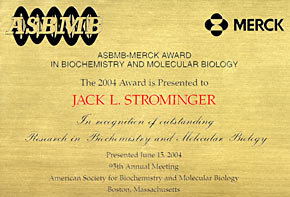Jack L. Strominger, Higgins Professor of Biochemistry in MCB, is the recipient of the 2004 ASBMB-Merck Award in recognition of his outstanding contributions to research in biochemistry and molecular biology. In conjunction with the Award, Dr. Strominger spoke at the Annual Meeting of the American Society for Biochemistry and Molecular Biology (ASBMB) in Boston, June 15, on “The Structure of MHC Proteins and the Therapy of Multiple Sclerosis.”
Dr. Alexander Rich, William Thompson Sedgwick Professor of Biophysics in the Department of Biology, Massachusetts Institute of Technology, in nominating Dr. Strominger for the Award, noted Dr. Strominger’s signal contributions in two distinct fields involving molecular recognition in immunity and infection.
Dr. Strominger’s early research focused on the chemical structure of bacterial cell walls and how penicillin is recognized by bacterial enzymes. Dr. Rich notes that “The field is now having a renaissance based on his early work. The bacterial cell wall components that he identified (and many of whose structures he elucidated) are now under investigation as the ligands for the Toll-like receptors on dendritic cells, the primary responders in the early innate immune system response. He discovered around 30 specific enzymes required for the biosynthesis of bacterial cell walls. As a result of emergence of drug resistant bacteria, many of these are now under investigation as possible targets for new chemotherapeutic agents….His remarkable 1965 and 1980 publications on the penicillin mechanism were shown only [a few years ago] to be correct in even their most detailed hypotheses.”
But this was only the first phase of Dr. Strominger’s research. As Herbert Tabor, Editor of the Journal of Biological Chemistry, published by the ASBMB, commented, “About 30 years ago he completely changed his interests and carried out critical experiments on the structures of the human major histocompatibility antigens and their roles in the immune system.” Major histocompatibility complex (MHC) antigens are key components of the immune system, involved in the recognition of self and foreign peptides. They are central to the cell response to infection and also to the immune response to grafts and transplantation, where transplanted tissue may be “recognized” as an infectious agent.
In two pathbreaking papers in the Journal of Biological Chemistry, Dr. Strominger reported two classes of MHC proteins (Class I and II) that are closely related in structure, their difference lying in the linkage of their four domains. Only one class had previously been recognized. Beyond this, Dr. Strominger was able to distinguish and crystallize several isotypes of the two classes of proteins.
In the course of this work, Dr. Strominger collaborated with the late Dr. Don Wiley, also of MCB, on the 3-D structure of MHC proteins. Dr. Wiley died in a tragic accident in 2001. In an interview, Dr. Strominger noted that it was a “very fruitful collaboration, because we brought different approaches to science and different expertise to the research. He was a great scientist and a wonderful person.”
In recent work, Dr. Strominger has applied the MHC work to study of human autoimmune diseases and in particular, multiple sclerosis (MS). He has redesigned a copolymer to better bind to the HLA-DR2 allotype of MHC II that is associated with MS and showed that this better-fitting copolymer was more effective than the existing copolymer as a therapeutic tool in treatment of experimental autoimmune encepahlomyelitis, the mouse model of MS.
In an interview, Dr. Rich commented that in his work on MHC, “Dr. Strominger elucidated a central piece of the immune system.” That Dr. Strominger was able to make such important findings in a second area of research is, according to Dr. Rich, a tribute to his “versatility as a scientist and his nose for important research. The question of transplantation was just a big black box,” when Dr. Strominger first looked at it. “But he recognized that it was an important problem; solving it led to important insights.”
Dr. Strominger himself takes an unassuming view of the course of his research. “When I arrived at Harvard, I thought that penicillin research would not be as interesting as before, and I sought out new problems. The two areas of research turned out to be closely related, but I hadn’t intended that. You can’t really predict the outcome.” Dr. Strominger expressed gratitude that the ASBMB-Merck Award “recognizes 50 years of work in two different areas. It may be the first time that I’ve received an award that included both areas of my research.”
Dr. Rich commented: “No other biochemist has pioneered more broadly in our science. His early discoveries are a milestone in microbiology. The later discoveries are arguably the most important contribution to the molecular basis of immune recognition in the past few decades.” The ASBMB-Merck Award is a recognition of these achievements.


